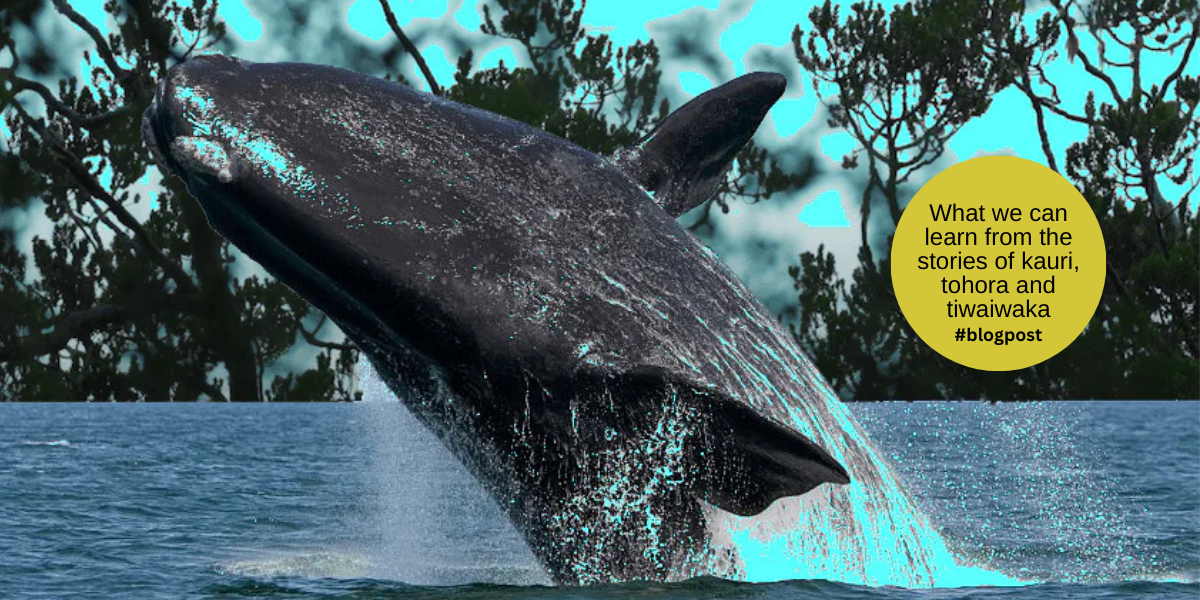
What Kauri and Tohorā Teach Us About Survival
Once plentiful, Kauri and Tohorā now face the threat of extinction. To save them, we need to listen to the message of Tīwaiwaka.
We’ve heard this story before. Once it was whaling and logging that New Zealand’s economy relied upon. Today, it is farming, fishing, gas and oil exploitation, and the dismantling of environmental protections such as the Resource Management Act.
But the truth remains: our survival depends not on taking more, but on learning to take only what we truly need — no more, no less.
[Watch here: https://youtu.be/oeTJzfVlDhk]
Brothers of Land and Sea
Twenty million years ago, the ancestors of Kauri (Agathis australis) and Tohorā (southern right whale, Eubalaena australis) lived side by side as brothers. Though inseparable, Tohorā longed for the ocean. When he left, they exchanged gifts: Kauri gave his oil for warmth, while Tohorā gave his skin so that Kauri could grow tall above the forest canopy.
From then on, Kauri occupied the ridges of Aotearoa, watching for his brother’s return. Tohorā, in turn, travelled the world’s oceans but always returned home, hugging the coastline to see his brother on the hills.
But as time passed, both brothers suffered. Kauri grew cold without his oil and retreated to the warmer north. Tohorā found love in the seas but would never venture too far, staying close to his homeland.
From Abundance to Exploitation
With the industrial revolution, people themselves grew unwell — disconnected from the land, moving to cities, and demanding more from Papatūānuku than she could give. Kauri and Tohorā became commodities: goldmines of the forest and sea.
Kauri for his timber. Tohorā for his oil.
Both were harvested to near extinction.
- 96% of their populations destroyed.
- Ancient trees felled without hesitation.
- Southern right whales reduced to fewer than 40 worldwide.
And people, blinded by greed and detachment, grew deaf to Papatūānuku’s voice.
The Message of Tīwaiwaka
Enter Tīwaiwaka — the small, fearless fantail who once challenged Kupe. A restless messenger and protector of Tāne Mahuta’s domain.
Tīwaiwaka comes again with urgency: reminding us that hope lies in choosing a higher path. If we can see that caring for the whenua is not a burden but our greatest privilege, there is still time.
The plight of Kauri today, weakened by Phytophthora agathidicida (kauri dieback), habitat loss, pollution, and climate change, is a tohu — a sign of what awaits us if we do not change course.
Our survival, like theirs, depends on the survival of all species around us.

A Call to Action
The survival of Kauri will require more than science alone. Antidotes may slow disease, but without restoring mauri — the life force of Papatūānuku — the cycle of destruction will continue.
We must:
- Prioritise healing ecosystems, not just species.
- Recognise that economic empires serving a few will not save us.
- Unite in humility and courage, as Rob McGowan reminds us, to restore balance together.
In the words of environmental advocate Rob McGowan: “Rangatiratanga is not about power and authority; it’s about humility and courage. Humility enables us to see that, if we are to meet the challenges of our time, we need to work together. Courage is what is needed to take the lead in bringing the people together to achieve that”.
Like Kauri, none of us exists in isolation. Our strength lies in connection — to one another, and to the land that sustains us.
The choice is ours.
Want to learn more?
- Explore more kōrero from me on my YouTube channel here - https://www.youtube.com/@DonnaKerridge
- If you’d like to learn with me directly, I have an online training programme you can access from anywhere in the world https://www.oraonline.nz/
- If you are a business interested in cultural wellbeing training or keynote speaking, get in touch with me here https://oranewzealand.com/pages/about-us
Ngā manaakitanga,
Donna & the Ora team

Leave a comment